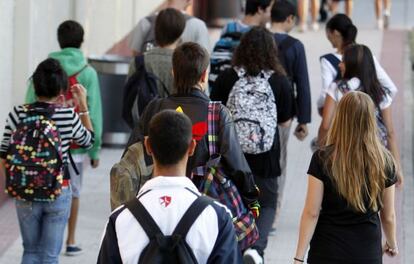No improvement in math, but Spanish students edge up in reading and science
OECD’s latest Pisa global education survey places Spain slightly below average

The results of the latest Pisa survey, which assesses the performance of students worldwide every three years, show Spain remains slightly below average in math, reading and science.
Administered by the Organisation for Economic Co-operation and Development (OECD) and taken by over 500,000 15-year-olds from 65 countries and regions, the tests are viewed by national governments as a reflection of the success or failure of their education policies.
While Asian countries and regions continued to top the charts in all three categories in the 2012 Pisa tests, Spain scored below other developed countries, including the United States, on reading and science.
Spanish students scored an average 484 points on math (up from 483 in 2009), putting it in 33rd place. This compares with an EU average of 489, while the top score went to the Chinese city of Shanghai with 613 points.
In reading, Spain improved slightly from 481 points in 2009 to 488, which compares with an OECD average of 496. The Spanish science score was 496 (also up from 488 in 2009), while the OECD average is 501.
Spain’s secretary of state for education, Montserrat Gomendio, took the results to mean that the downward trend has been “bucked.”
“We used to have poor results but socioeconomic parity, and for the first time since Pisa tests are administered, it is no longer that way.”
Gomendio said that in the Spanish regions with the worst results, such as Andalusia and Extremadura, the bad scores were not so much the result of poor education policies as the students’ low socioeconomic status.
All the Pisa reports to date note the same pattern for Spain: good socioeconomic parity (in 2009, 36 percent of the poorest students obtained the highest scores, compared with a 31-percent OECD average), but a lack of excellent students: just eight percent in math in 2012 compared with 12 percent in developed countries.
As the influence of the report has grown in recent years, so too has criticism of the partisan or distorted way in which it is occasionally used. Some observers also question the reliability of the study itself.
Tu suscripción se está usando en otro dispositivo
¿Quieres añadir otro usuario a tu suscripción?
Si continúas leyendo en este dispositivo, no se podrá leer en el otro.
FlechaTu suscripción se está usando en otro dispositivo y solo puedes acceder a EL PAÍS desde un dispositivo a la vez.
Si quieres compartir tu cuenta, cambia tu suscripción a la modalidad Premium, así podrás añadir otro usuario. Cada uno accederá con su propia cuenta de email, lo que os permitirá personalizar vuestra experiencia en EL PAÍS.
¿Tienes una suscripción de empresa? Accede aquí para contratar más cuentas.
En el caso de no saber quién está usando tu cuenta, te recomendamos cambiar tu contraseña aquí.
Si decides continuar compartiendo tu cuenta, este mensaje se mostrará en tu dispositivo y en el de la otra persona que está usando tu cuenta de forma indefinida, afectando a tu experiencia de lectura. Puedes consultar aquí los términos y condiciones de la suscripción digital.








































